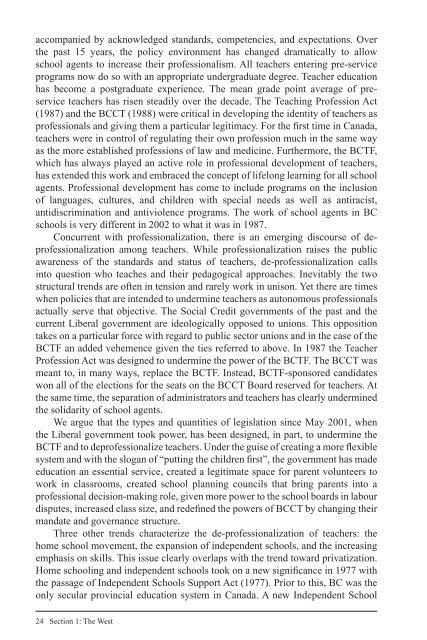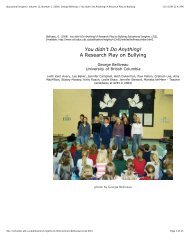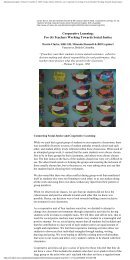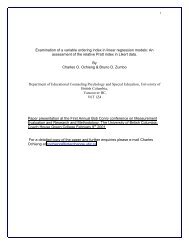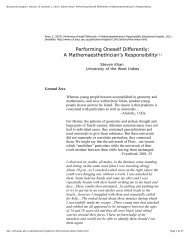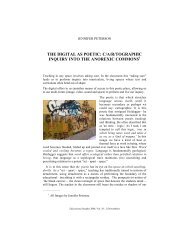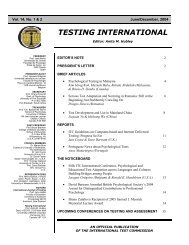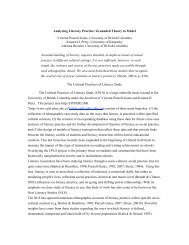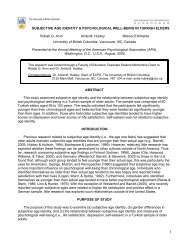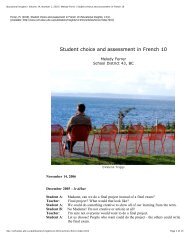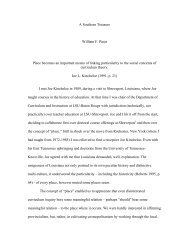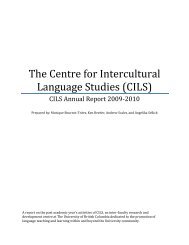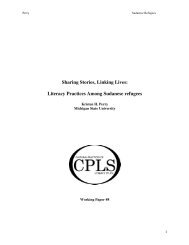The evolution of professionalism - Centre for Policy Studies in ...
The evolution of professionalism - Centre for Policy Studies in ...
The evolution of professionalism - Centre for Policy Studies in ...
Create successful ePaper yourself
Turn your PDF publications into a flip-book with our unique Google optimized e-Paper software.
accompanied by acknowledged standards, competencies, and expectations. Over<br />
the past 15 years, the policy environment has changed dramatically to allow<br />
school agents to <strong>in</strong>crease their pr<strong>of</strong>essionalism. All teachers enter<strong>in</strong>g pre-service<br />
programs now do so with an appropriate undergraduate degree. Teacher education<br />
has become a postgraduate experience. <strong>The</strong> mean grade po<strong>in</strong>t average <strong>of</strong> preservice<br />
teachers has risen steadily over the decade. <strong>The</strong> Teach<strong>in</strong>g Pr<strong>of</strong>ession Act<br />
(1987) and the BCCT (1988) were critical <strong>in</strong> develop<strong>in</strong>g the identity <strong>of</strong> teachers as<br />
pr<strong>of</strong>essionals and giv<strong>in</strong>g them a particular legitimacy. For the fi rst time <strong>in</strong> Canada,<br />
teachers were <strong>in</strong> control <strong>of</strong> regulat<strong>in</strong>g their own pr<strong>of</strong>ession much <strong>in</strong> the same way<br />
as the more established pr<strong>of</strong>essions <strong>of</strong> law and medic<strong>in</strong>e. Furthermore, the BCTF,<br />
which has always played an active role <strong>in</strong> pr<strong>of</strong>essional development <strong>of</strong> teachers,<br />
has extended this work and embraced the concept <strong>of</strong> lifelong learn<strong>in</strong>g <strong>for</strong> all school<br />
agents. Pr<strong>of</strong>essional development has come to <strong>in</strong>clude programs on the <strong>in</strong>clusion<br />
<strong>of</strong> languages, cultures, and children with special needs as well as antiracist,<br />
antidiscrim<strong>in</strong>ation and antiviolence programs. <strong>The</strong> work <strong>of</strong> school agents <strong>in</strong> BC<br />
schools is very different <strong>in</strong> 2002 to what it was <strong>in</strong> 1987.<br />
Concurrent with pr<strong>of</strong>essionalization, there is an emerg<strong>in</strong>g discourse <strong>of</strong> depr<strong>of</strong>essionalization<br />
among teachers. While pr<strong>of</strong>essionalization raises the public<br />
awareness <strong>of</strong> the standards and status <strong>of</strong> teachers, de-pr<strong>of</strong>essionalization calls<br />
<strong>in</strong>to question who teaches and their pedagogical approaches. Inevitably the two<br />
structural trends are <strong>of</strong>ten <strong>in</strong> tension and rarely work <strong>in</strong> unison. Yet there are times<br />
when policies that are <strong>in</strong>tended to underm<strong>in</strong>e teachers as autonomous pr<strong>of</strong>essionals<br />
actually serve that objective. <strong>The</strong> Social Credit governments <strong>of</strong> the past and the<br />
current Liberal government are ideologically opposed to unions. This opposition<br />
takes on a particular <strong>for</strong>ce with regard to public sector unions and <strong>in</strong> the case <strong>of</strong> the<br />
BCTF an added vehemence given the ties referred to above. In 1987 the Teacher<br />
Pr<strong>of</strong>ession Act was designed to underm<strong>in</strong>e the power <strong>of</strong> the BCTF. <strong>The</strong> BCCT was<br />
meant to, <strong>in</strong> many ways, replace the BCTF. Instead, BCTF-sponsored candidates<br />
won all <strong>of</strong> the elections <strong>for</strong> the seats on the BCCT Board reserved <strong>for</strong> teachers. At<br />
the same time, the separation <strong>of</strong> adm<strong>in</strong>istrators and teachers has clearly underm<strong>in</strong>ed<br />
the solidarity <strong>of</strong> school agents.<br />
We argue that the types and quantities <strong>of</strong> legislation s<strong>in</strong>ce May 2001, when<br />
the Liberal government took power, has been designed, <strong>in</strong> part, to underm<strong>in</strong>e the<br />
BCTF and to depr<strong>of</strong>essionalize teachers. Under the guise <strong>of</strong> creat<strong>in</strong>g a more fl exible<br />
system and with the slogan <strong>of</strong> “putt<strong>in</strong>g the children fi rst”, the government has made<br />
education an essential service, created a legitimate space <strong>for</strong> parent volunteers to<br />
work <strong>in</strong> classrooms, created school plann<strong>in</strong>g councils that br<strong>in</strong>g parents <strong>in</strong>to a<br />
pr<strong>of</strong>essional decision-mak<strong>in</strong>g role, given more power to the school boards <strong>in</strong> labour<br />
disputes, <strong>in</strong>creased class size, and redefi ned the powers <strong>of</strong> BCCT by chang<strong>in</strong>g their<br />
mandate and governance structure.<br />
Three other trends characterize the de-pr<strong>of</strong>essionalization <strong>of</strong> teachers: the<br />
home school movement, the expansion <strong>of</strong> <strong>in</strong>dependent schools, and the <strong>in</strong>creas<strong>in</strong>g<br />
emphasis on skills. This issue clearly overlaps with the trend toward privatization.<br />
Home school<strong>in</strong>g and <strong>in</strong>dependent schools took on a new signifi cance <strong>in</strong> 1977 with<br />
the passage <strong>of</strong> Independent Schools Support Act (1977). Prior to this, BC was the<br />
only secular prov<strong>in</strong>cial education system <strong>in</strong> Canada. A new Independent School<br />
24 Section 1: <strong>The</strong> West


